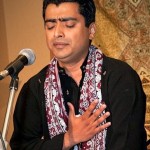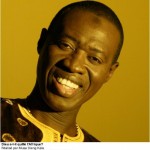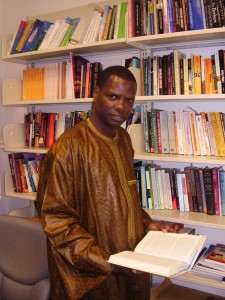This performance and discussion festival will look at two sufi or sufi-inspired sects: the mourides and the ismailis to understand how music and poetry preserved and propagated the faiths. It will also ask probing questions about diasporic identities and explore the relationships between politics, music, religion and culture.
Musicians
Dr. Karim Gillani, Assistant Professor, Sufi and Ghazal Musician (Official Music Site)
Karim Gillani obtained his PhD in Music and Religious studies at the University of Alberta in 2012. His PhD dissertation entitled Sound and Recitation of Khoja Ismaili Ginans: Tradition and Transformation is the first detailed ethnomusicological study that situates ginans within the wider context of Muslim piety in general and within the South Asian poetic and musical contexts in particular. He has an MA in Music and Religious Studies from the University of Alberta (2005), and is a graduate of the Institute of Ismaili Studies in Islamic Studies and Humanities.
Karim is an accomplished vocalist, composer and songwriter. He was trained in Hindustani classical and Sufi music by various renowned musicians from India and Pakistan. He has taught voice for the Indian Music Ensemble, University of Alberta since 2010. He performs various genres of music including Ginan’s, Kafi, Qawwali, Ghazal’s, Nashid, and Indo-Pakistani cinema songs.
Moussa Dieng Kala, PhD. Candidate, Senegalese Sufi Singer and Poet (Music video)
 Musa Dieng Kala led Studio Xippi (owned by Youssou Ndour). He has directed two music videos for the Senegalese star and now Cultural Minister, “Country Man” and “Live TV”. In 1993 he moved to Montreal in order to develop skills in cinema. He has three albums: Shakawtu, faith and Salimto and “Exile”, all fed by Sufi spirituality of the Muslim Brotherhood Mourides. He has directed two feature films Borom Touba shot in 2001, has God left Africa? (2006).
Musa Dieng Kala led Studio Xippi (owned by Youssou Ndour). He has directed two music videos for the Senegalese star and now Cultural Minister, “Country Man” and “Live TV”. In 1993 he moved to Montreal in order to develop skills in cinema. He has three albums: Shakawtu, faith and Salimto and “Exile”, all fed by Sufi spirituality of the Muslim Brotherhood Mourides. He has directed two feature films Borom Touba shot in 2001, has God left Africa? (2006).
Panelists
Cheikh Anta Babou, Associate Professor of History and African Studies, University of Pennsylvania (Video of a lecture)
 Prof. Babou joined the history department of the University of Pennsylvania in Philadelphia in 2002. He teaches African History and the History of Islam in Africa. His research focuses on mystical Islam in West Africa and Senegal and on the new African diaspora.
Prof. Babou joined the history department of the University of Pennsylvania in Philadelphia in 2002. He teaches African History and the History of Islam in Africa. His research focuses on mystical Islam in West Africa and Senegal and on the new African diaspora.
Professor Babou has published extensively on the Muridiyya Muslim order of Senegal and the Senegalese diaspora. His book, Fighting the Greater Jihad: Amadu Bamba and the Founding of the Muridiyya of Senegal, 1853-1913 was published by Ohio University Press in 2007. Dr. Babou’s articles appeared in African Affairs, Journal of African History, International Journal of African Historical Studies, Journal of Religion in Africa, Africa Today and other scholarly journals in the United States and in France. He has presented papers in international scholarly meetings on Islam and the transnational migration of West African Muslims. He is an editor of the Journal of African History circa 2011-2016, and is also affiliated to the African Studies Center and the Center for Africana Studies. His current research project examines the experience of West African Muslim immigrants in Europe and North America.
Dr. Babou earned his Licence, Maîtrise, Diplôme d’Etudes Approfondies in History, and Educational Inspector Diploma from Université Cheikh Anta Diop, Dakar, Senegal. His Ph.D. is from Michigan State University.
Accompanying musicians
Tabla: Jim Feist has been performing and teaching the tabla for the last 18 years. He has traveled to India several times to learn tabla from the late, legendary Ustad Allah Rakha, and Vibhav Nageshkar. For the past decade Jim has been under the tutelage of Ustad Allah Rakha’s celebrated disciple, Pandit Yogesh Samsi. He has also studied from Sukvinder Singh Namdhari, Samir Chatterji, Anand Badamakar, and a handful of other notable players. His interaction with such tabla intellectuals as Pandit Sudhir Mainkar and Dr. Lowell Lybarger have also enhanced his knowledge of this vast art-form. Jim has been recorded on albums by composer Kanniks Kannikeswaran for two all India releases, and an album of pure Dhrupad music called “Banaras” released in March ’06.
Keyboard: Altaz Ibrahim. Altaz is a student of finance in Calgary. His passion is Sufi music and he plays keyboards.
Sitar: Hans Utter has studied intensively in India for over a decade in the tradition of the Imdad Khan gharana, passed down for seven generations, under the tutelage of Ustad Sujaat Khan, son of Ustad Viliyat Khan, the world renowned sitarist. The heart of the Indian Classical Music tradition is the knowledge passed down from generation to generation in the vessel of the gharana. He holds a degree in sitar from the Benares Hindu University School of Music, where he studied with Dr. Rajman Singh.The style taught by his guru, the gyaki ang, is based on the subtle nuances of vocal music, and brings out the beauty inherent in the ragas.